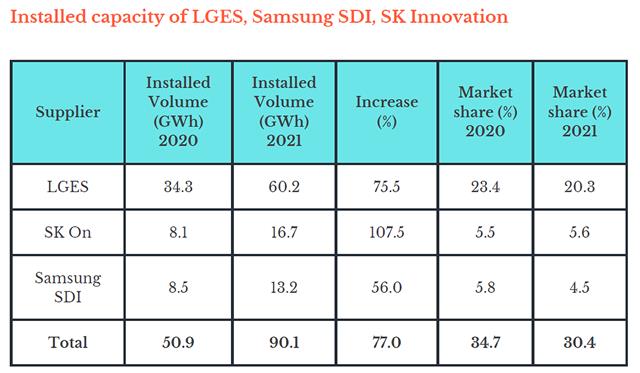South Korea is building up the necessary infrastructure to position itself as a leader in the global electric vehicle (EV) supply chain, with its top three EV battery manufacturers controlling about one-third of the global battery market.
A DIGITIMES Asia recent report, "2022 EV battery value-chain outlook in Asia," provides a comprehensive overview of the South Korea EV battery industry. Below is the summary of the report.
The country's three main EV battery manufacturers, LG Energy Solution (LGES), Samsung SDI, and SK Innovation, are all planning for production expansion in 2022. While their focus has been on ternary batteries over the years, the companies recently began developing lithium iron phosphate (LFP) batteries, which are cheaper and safer than ternary batteries.

Credit: KITA; compiled by DIGITIMES, March 2022
Other domestic EV battery manufacturers, including Enertech International, Kokam, and Sebang Global Battery, have also established some competitiveness in the industry by either developing innovative battery manufacturing technologies or expanding their production capacities at home and overseas.
Although South Korea has a heavy reliance on China for EV battery raw materials, battery manufacturers in the country are diversifying supply sources and finding ways to secure access to future raw materials. Local suppliers of cathode/anode materials for EV batteries are also coming up with strategies to strengthen their competitiveness in the global supply chain.
Posco Chemical is focusing on raising the nickel content in cathode materials. EcoPro BM is planning to complete its first overseas cathode materials factory by late 2024, and L&F is aiming to boost its annual production capacity at its South Korea plants to 200,000 tons in 2025.
In terms of lithium-ion battery recycling, South Korea is standing at the forefront of the industry. The country has announced a four-year lithium-ion battery technology development project and set up waste resources collection centers in three provinces and one city to collect used EV batteries.
Besides major battery manufacturers and battery material suppliers that have made large investments in the EV battery recycling business, companies like Earthtech, GS E&C, and Sungeel HiTech all established new recycling plants recently and have ongoing projects in South Korea and elsewhere.
To get the full content of this article, you may download the report via "2022 EV battery value-chain outlook in Asia."
Editor note: DIGITIMES Asia just released a series of industry reports, focusing on the "2022 EV battery value-chain outlook in Asia." The reports are divided into 3 parts – Overview of East and Northeast Asia EV battery supply chains, Southeast Asia, India EV battery and material supply chains, and EV battery tech trends and promising startups. These member-exclusive reports are now available for EV Weekly Subscribers.




